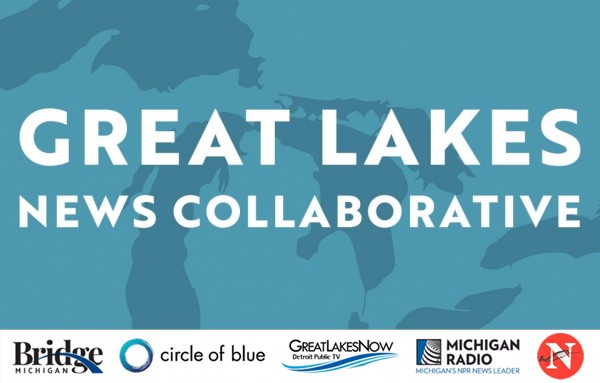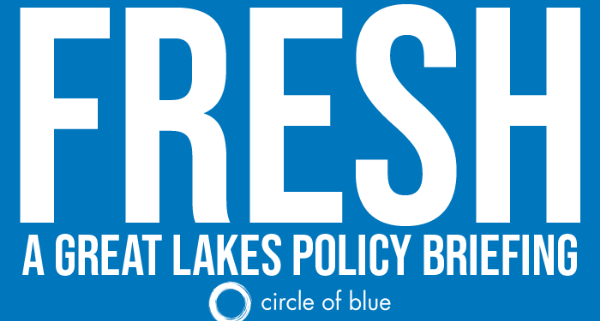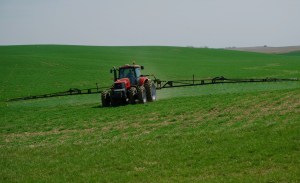Fresh, April 16, 2024: Campbell Soup’s Phosphorus Discharge a Focal Point of Lake Erie Pollution Litigation
April 16, 2024
Fresh is a biweekly newsletter from Circle of Blue that unpacks the biggest international, state, and local policy news stories facing the Great Lakes region today. Sign up for Fresh: A Great Lakes Policy Briefing, straight to your inbox, every other Tuesday.
— Christian Thorsberg, Interim Fresh Editor
This Week’s Watersheds
- A last-minute change to a dredging project for a St. Lawrence River port in upstate New York will require a new environmental review.
- Norfolk Southern agreed to pay $600 million in response to the February 2023 train derailment in East Palestine, Ohio — but some in the community want more accountability before accepting the deal.
- Environmental groups in Ohio are targeting industries and companies — including Campbell Soup — they say are polluting waterways with toxic amounts of phosphorus.
- Climate change-induced rainfall in Minnesota and Wisconsin is making lakes more opaque in summers, affecting the survivability of common loons.
In a brief made public last week, the Department of Justice heavily criticized the energy company Enbridge for trespassing on land belonging to the Bad River Band of the Lake Superior Tribe of the Chippewa Indians in northern Wisconsin.
“[Enbridge’s action] sends a troublesome message to others who may want to trespass on Indian lands that they may retain a substantial amount of their profits that are appropriately attributable to the trespass.” — Department of Justice, in a legal filing.
U.S. government lawyers condemned the energy company Enbridge in a newly published amicus brief, stating that its Line 5 oil pipeline continues to unlawfully trespass on tribal land and places both the environment and freshwater resources at considerable risk. The DOJ also criticized the leniency of the U.S. District Court for the Western District of Wisconsin, which ruled in June 2023 that the company should pay the Bad River Band $5.1 million in restitution fees.
“The total restitution award constitutes 0.47 percent of Enbridge’s profits and avoided costs attributable to Line 5 as a whole, a paltry amount that permits Enbridge to profit handsomely from its trespass,” the brief said. The DOJ recommended the case be returned to the District Court, so they can reconsider and increase the amount of money the Bad River Band receives.
The Bad River Band sued Enbridge in 2019 for the pipeline’s environmental harm and for crossing through the Bad River reservation where its easements for rights-of-way had expired.
When discussing potential resolutions to the lawsuit, the DOJ used more measured language. If the pipeline is entirely shut down, the United States would be breaching its own treaty, signed in 1977 with Canada, which “ensures the uninterrupted transmission of hydrocarbons by pipeline between the two countries,” InsideClimate News reports.
Fresh from the Great Lakes News Collaborative

- EPA implements first-ever PFAS drinking water standards — Michigan Public
- Ghostly Grey Specters: How unprecedented water levels are fluctuating in the Georgian Bay — Great Lakes Now
- Good news for Michigan smelt season: PFAS levels lower than feared — Bridge Michigan
- Wild fish spring to life in Lake Ontario, despite dams, pollution and hatchery competitors — The Narwhal
Bridge Michigan, Circle of Blue, Great Lakes Now at Detroit Public Television, Michigan Public and The Narwhal work together to report on the most pressing threats to the Great Lakes region’s water. This independent journalism is supported by the Charles Stewart Mott Foundation. Find all the work here.

Environmental Groups Target Phosphorus Polluters, Including Campbell Soup, In Ohio
A civil lawsuit filed in late March accusing Campbell Soup of releasing phosphorus and other contaminants into northern Ohio waterways is just one of many efforts to curb the pollution that produces harmful algal blooms in Lake Erie, Ideastream Public Media reports.
Brought by Lake Erie Waterkeeper and Environment Ohio, the lawsuit presents research accusing the soup maker’s plant of releasing bacteria, phosphorus, oil, and grease, in amounts greater than allowed by its permit, into the Maumee River and its tributaries. On behalf of the Environmental Protection Agency, the Department of Justice also brought a federal suit against Campbell Soup.
But it isn’t just one company contributing to water pollution in Ohio. Fertilizer runoff from farming remains a key source of phosphorus pollution, which feeds the algal blooms that harm humans, pets, the environment, and economies. Meat packing and other agricultural industries are also top contributors, environmental advocates say.
In Context: How Big Ag Pollutes America’s Waters and Makes Money Doing It
In the News
Clarity and Loons: A new study published in the journal Ecology links climate change with at-risk loon populations in the Great Lakes region. An increased frequency of summer rainfall — attributed to climate change — is washing sediment into lakes, turning waters more cloudy on average. This decreased visibility, the study says, impairs a loon’s ability to hunt and feed its chicks. Long-term projections indicate that temperature and precipitation extremes could cost loons nearly their entire breeding range across the Lower 48 states, Minnesota Public Radio reports.
Norfolk Southern Settlement: The transport company has agreed to pay $600 million to resolve a consolidated class action lawsuit brought in response to the February 2023 derailment that spilled toxic chemicals in East Palestine, Ohio. As part of the agreement, all class action claims filed within 20 miles of the spill will be settled, and anyone living within 10 miles of the spill will be entitled to compensation for “past, current or future personal injury from the derailment,” the Ideastream Public Radio reports. But some residents say the environmental and health impacts of the derailment are ongoing, and they aren’t inclined to accept a settlement that doesn’t include accountability from Norfolk Southern. “How are you settling when the issue’s still there?” one resident tells Ideastream.
Looking Ahead
Ogdensburg Dredging: A new environmental review will be conducted in the St. Lawrence River, as a port dredging project scheduled to begin in 2025 will now have a new dump site, the Watertown Daily Times reports. Dredged riverbed was going to be dumped at Ogdensburg International Airport, but the U.S. Army Corps of Engineers withdrew from the project due to high expenses of roughly $33 million. The change gives the Ogdensburg Bridge and Port Authority more flexibility. The authority chose Commerce Park as the new dump site, a decision that will require a $32,000 environmental report before approval.
Upcoming Events
April 17 — Webinar: The Ethics of Sharing Great Lakes Water — learn more
April 24 — Sanctuary Lecture Series: Birds of the Thunder Bay National Marine Sanctuary — learn more
May 12 – 16 — International Conference on Aquatic Invasive Species — learn more
Other News
Plastic Beach Trash: A new study from the Alliance for the Great Lakes finds that 86 percent of all trash collected on beaches across the Great Lakes is made of plastic, Bridge Michigan reports.
Tyco Payout: Water systems in Wisconsin that were contaminated with PFAS-containing firefighting foam manufactured by Tyco Fire Products will be compensated after the company agreed to pay a $750 million settlement, Wisconsin Public Radio reports.
Christian Thorsberg is an environmental writer from Chicago. He is passionate about climate and cultural phenomena that often appear slow or invisible, and he examines these themes in his journalism, poetry, and fiction.






Leave a Reply
Want to join the discussion?Feel free to contribute!